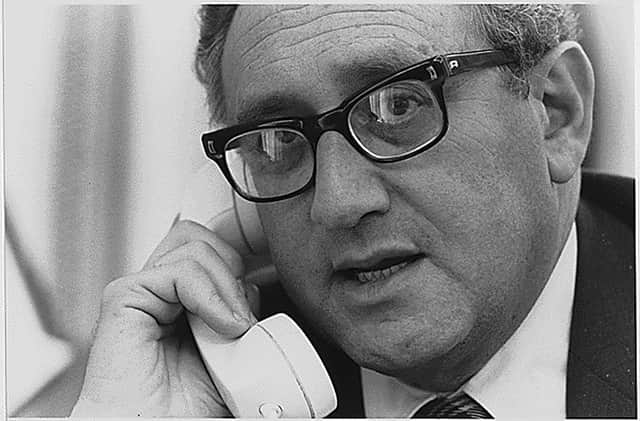Scotland can't just play the perfect friend on the world stage - Alastair Stewart


Many forget the former U.S. Secretary of State is an academic and Dr Kissinger, for most of his career, has been a tormented idealist. The archetypal Machiavel figure argued in 1975 for the "need for a moral foundation for foreign policy” and the irony will not be lost on those who know his record in office.
Dr Kissinger embodies the duality of American foreign policy. The American experience is a warning to those who look through rose-tinted glasses at Scottish independence. Whether the U.S. should impose its vision of democracy and values on the world or inspire others to achieve it has haunted the country since its beginnings. It will stalk and disappoint Scots, too.
Advertisement
Hide AdAdvertisement
Hide AdBeing a "good global citizen" is a prominent propaganda theme in the SNP's vision for an independent Scotland. The SNP always make the case that Scotland' s values are wholly at odds with Westminster's inhumanity. With independence, we could remove nuclear weapons, put human rights first, avoid military engagements, and place a premium on internationalism. Scotland would play a 'good guy' role with no enemies and be rewarded with tolerance, kindness and reciprocal goodwill.
The rhetoric to date is wholly impractical, naive and lacking historical perspective. Scottish exceptionalism is just cognitive dissonance. Like most independence soundbites, substantive proposals and costings do not exist. How much would such a foreign policy cost, how many civil servants, how many new ministerial portfolios?
There are currently eight Scottish Government overseas offices in seven countries, excluding London. Two Freedom of Information requests this year revealed the operating costs are nearly 6m with at least 37 staff. The Constitution, Europe and External Affairs (CEEA) portfolio has a budget of £80.3m for 2021/22.
Under any independence plans, this would likely have to be significantly increased, and the external affairs portfolio redefined to incorporate defensive and security functions. Formal participation in summits, trade delegations, educational and cultural missions, embassies, consulates and staff will expand or begin anew. There will be the cost of rent, construction and security.
Where would our intelligence come from, what would our defence spending be, how much would moralpolitik really be a driving force? Would we engage in pre-emptive military engagements to prevent wholesale slaughter? How would we identify enemies, friends, alliances and just wars?
The idea we could inexpensively become the world's good guy with no cost, both in treasure and global political capital, is absurd. Foreign affairs is a football in the independence argument. It needs to move beyond moral posturing and sensationalism.
An interesting lesser-known SNP manifesto pledge at the 2021 election to support the creation of a Scottish Council on Global Affairs (SCGA) might hold the key.
The council is also supported by the the Liberal Democrats, who said such an organisation would be "an independent, non-partisan centre of expertise on international affairs”.
Advertisement
Hide AdAdvertisement
Hide AdScottish Labour see it as "an independent repository of expertise on international affairs, helping to enhance knowledge of international affairs within Scotland." The SNP hope it will "develop critical thinking on international issues and Scotland's place in the world”.
The Scottish Conservatives failed to make the pledge; no doubt concerned to open this very Pandora's Box on a reserved matter. The Centre on Constitutional Change notes the SCGA would "provide a hub for collaborative policy-relevant research and a home for informed, non-partisan debate on all areas of global affairs, broadly defined. The Council would be non-partisan, independent body, supporting and showcasing evidence-based research on global affairs."
International relations in Scottish public life has been relegated to a virtue-signalling tool. With COP26 coming to Glasgow later this year, there will be renewed romanticism about Scotland's global potential: all the things Scotland could do unilaterally and multilaterally to address environmental issues, the global economy, human rights and the peaceful resolution of old conflicts.
An impartial reality check would do much to bring a little substance to a complicated subject. Six of Scotland's 15 universities offer international relations degrees. Independence in the Twittersphere is often more about what Scotland could do in the world than what the world would do to Scotland.
Scotland needs to focus first and foremost on bringing pragmatic international relations goals to public life. Think tanks Chatham House, the European Council of Foreign Affairs and the Carnegie Endowment for International Peace are recognised for their non-partisan policy debates. We urgently need the same.
Around 350 of America's universities offer an international relations major. Despite that, it's a historical irony that some surveys suggest most Americans are hardly knowledgeable and indifferent to international affairs.
There's an eerie warning for many - who even reluctantly - look to the USA as a natural bulwark against climate change, expanding cyber warfare, the ambitions of China and a resurgent Russia. Who will Scotland rely on? Will it draw a line in the sand, or will it compromise? If it moves one moral inch, then why not a mile?
The American success of reconciling those tensions between realism and idealism are mixed. Scotland needs to grapple with these issues now to consider realistic foreign policy ambitions before another independence referendum.
Advertisement
Hide AdAdvertisement
Hide AdEven if one is not forthcoming, it will help bring about a better historical understanding of Scotland's foreign policy before 1707 and the partnership that made an Empire afterwards. Scottish exceptionalism is a myth.
As diplomat Sir Henry Wotton said, "An ambassador is an honest gentleman sent to lie abroad for the good of his country." This has not changed.
